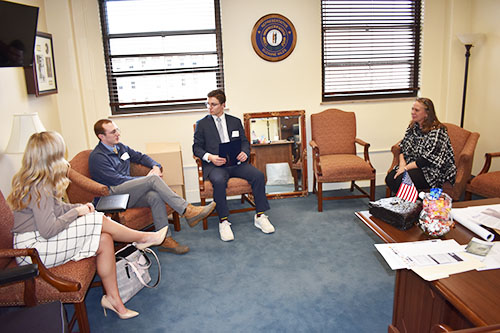Addison Watson
Staff Writer
awatson25@murraystate.edu
Eleven members of Murray State’s Student Government Association joined other Kentucky college students in the state capital to lobby for the importance of higher education.
While newly-elected Democrat Gov. Andy Beshear is pushing his “education first” budget proposal with much of his focus on higher education, it is up to the Republican-controlled legislature to determine if his budget will pass in the General Assembly.
Members from Murray State’s SGA met with several different legislators to advocate the needs of Murray State specifically, but also to urge legislatures not to cut from university funding.
According to Murray State’s Capital Project Requests, the No. 1 priority of the University is deferred maintenance and asset preservation. The Council on Postsecondary Education has approved a 2:1 request for nearly $37 million that will be directed toward the preservation, maintenance and modernization of aging historic buildings, updating electrical grids and energy efficiency.
The University’s general fund appropriates $24.5 million toward these projects while the University will debt an additional $12.3 million from CPE’s asset preservation fee.
The Board of Student Body Presidents proposed a resolution prior to the rally regarding the CPE’s budget proposal. The board is comprised of student body presidents from Centre College, Eastern Kentucky University, Kentucky State University, Morehead State University, Murray State University, Northern Kentucky University, University of Kentucky, University of Louisville, Western Kentucky University and two student representatives from the Kentucky Community and Technical College System.
The presidents hope their resolution to support CPE’s 2020-22 budget proposal will encourage the General Assembly to provide $400 million for asset preservation to safeguard historic infrastructures of Kentucky higher education campuses.
Beshear said in his recent visit to the University in his current budget proposal a performance funding model would not be in play because every university should be in a position where they can compete.
The Board of Student Body Presidents irrevocably believes a performance-based funding model should be implemented.
“It is not enough that the General Assembly fund the performance-based model, but it is economically and morally imperative that this be supported and financed,” according to the resolution.
The board’s resolution also requests that the General Assembly should increase its contribution to the performance funding model by seven percent to get all Kentucky public institutions to an equilibrium.
Given a performance funding model, SGA members lobbied for a permanent two percent stop-loss of base appropriation for the University.
Without a permanent two percent stop-loss, 100 percent of the University’s general fund appropriation is at risk. The University’s base appropriation amount is $44.5 million, making up 28 percent of the total revenue stream.
According to the resolution, if a 2 percent stop-loss provision is not implemented institutions could be in a worse position than before.
Trey Book, student regent and SGA president; Hannah Daab, senator for the Bauernfeind College of Business from New Athens, Illinois; and Jackson Hogg, freshman senator from Henderson, Kentucky, met with Rep. Suzanne Miles, R-District 7, about some of the challenges that Murray State faces.
“From my perspective, [Miles] was very on board with funding higher education and she understands our needs,” Book said. “She was very realistic about it.”
Miles voiced her concerns about the current budget proposal by Beshear and said it would be up to legislators in the General Assembly to figure out how to best balance the budget.
Rep. Walker Thomas, R-District 8, spoke to SGA members and said he was in constant communication with President Bob Jackson. Book said it was a very personal talk where Thomas discussed the relationship between the University and himself.
Book and other SGA members thought the event was very successful and rallies benefit students attending public universities.
“Any day that we can get in front of legislators and speak to them about higher education is a good day,” Book said.
Having attended nearly a dozen rallies for higher education, Jeanie Morgan, adviser to SGA, said she thinks any time students are able to have their voices heard by legislators, they should take the opportunity to do so.
“It was very important that our students got to go and meet with legislators,” Morgan said. “They told their stories but I think also the legislators talked to them about their experiences in college and [it] was very good that interaction happened.”




























































































